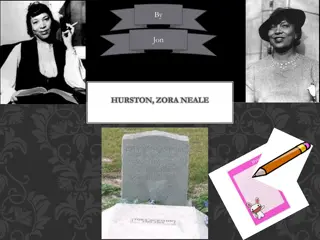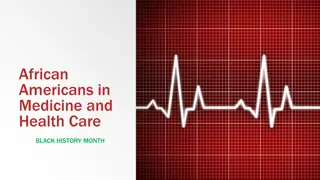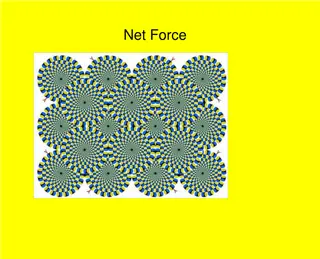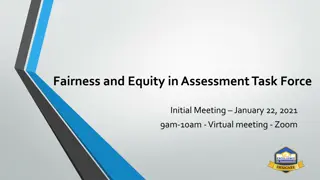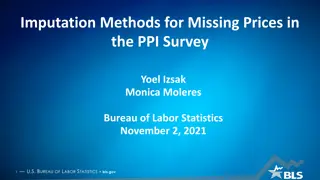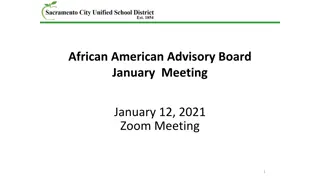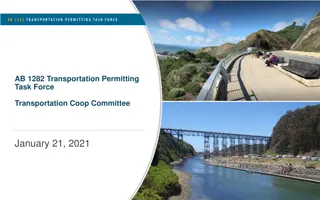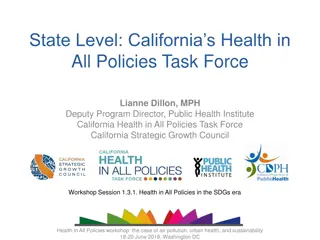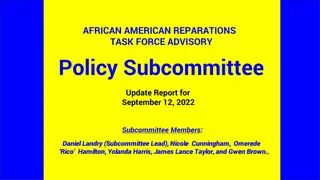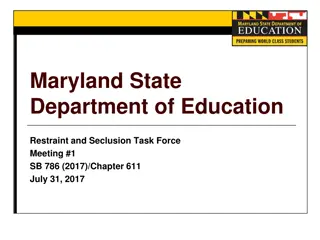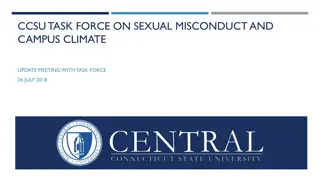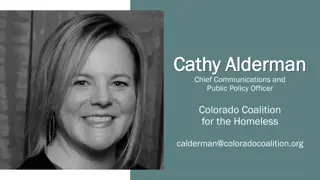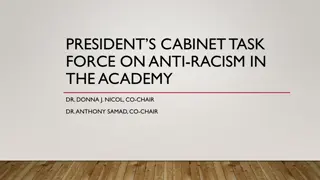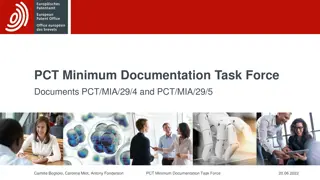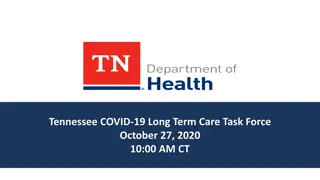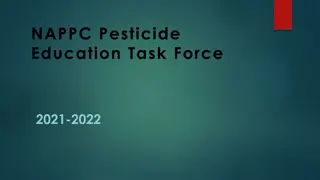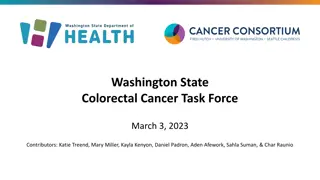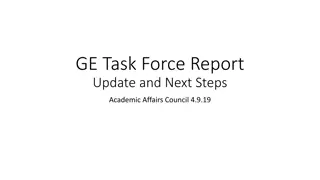Task Force Meeting: Missing and Murdered African American Women
The Missing and Murdered African American Women Task Force and Advisory Council will convene on July 29, 2022, to address critical issues surrounding the disappearance and harm of African American women. The agenda includes updates to the timeline, building relationships among members, discussing an Office of MMAAW, reviewing root causes, data analysis, and more. Public testimony is encouraged, and strategic engagements will guide the report finalization process. Attendees will also participate in a meaningful bingo activity to foster connections and collaboration.
Uploaded on Sep 12, 2024 | 0 Views
Download Presentation

Please find below an Image/Link to download the presentation.
The content on the website is provided AS IS for your information and personal use only. It may not be sold, licensed, or shared on other websites without obtaining consent from the author. Download presentation by click this link. If you encounter any issues during the download, it is possible that the publisher has removed the file from their server.
E N D
Presentation Transcript
Missing and Murdered African American Women Task Force and Advisory Council Meeting Friday, July 29, 2022 9-1 PM
1 Welcome and Opening
Approval of Minutes and Agenda Approval of May 27, 2022 Task Force Meeting Minutes Approval of June 29, 2022, Meeting Agenda
Public Testimony We will invite public testimony at the beginning of our Task Force meetings Additionally, people can offer public testimony through email. Please review the guidelines on the Office of Justice Programs website and send comments to researchsupport@researchinaction.com
Goals of Meeting 01 Provide updates to the timeline 02 Develop relationships between Task Force and Advisory Council members 03 Discuss an Office of MMAAW 04 Review and offer feedback on the root causes literature review 05 Receive data collection updates and reflect on analyzed data 06 Discuss a Data Walk
Timeline Council Meeting - December 8th Joint Task Force and Advisory Council Meeting - October 27th Council Meeting - August 11th Report due December 15th August October December November September Council Meeting - November 10 Data Walk - September 28th Task Force Meeting - November 18
Updated Timeline Strategic remote engagements throughout the early weeks to finalize report. No Council or Task Force Meeting - RIA finalizes data collection Data Walk - October 27th Report due December 15th August October December November September Joint Advisory Council and Task Force Meeting - November Meaning Making Session with Council and Task Force - September 28th
3 Bingo
To get to know each other better, we have a game of bingo! Connect with someone in the room and discuss one of the squares. Sign each other s sheet, and then find a new person with whom to discuss a new topic. When you complete the full bingo sheet, yell BINGO! You will then present to the group to confirm you ve achieved bingo!
Office of Missing and Murdered African American Women 4
6 7 Root Cause Literature Data Reflections and Updates 9 8 10 After Break Closing and Next Steps Healing Break Meaning Making and Data Walk
Break 5
6 Root Causes Literature
Final Report Structure Response to Violence Against Black Women and Girls and MMAAW Research into Systems that Historically Police Black Women and Girls Root Causes Recommendations Introduction Describe the root causes of violence against Black women and girls, including historic institutional harms, cultural depictions, and present day erasure. Identify the scope of MMAAW both nationally and regionally. Lay out clear, actionable recommendations for the state of Minnesota to end this violence and support Black women and girls, their families, and their communities. Discuss Minnesota s response to violence against Black women and girls and cases of MMAAW, including the institutions, practices, and policies that perpetuate violence. Introduce the MMAAW Task Force and Advisory Council. Identify the violence Black women and girls experience by someone or within systems like housing, child welfare, and education systems, and raise the ideas of how to make more responsive institutions and processes. Insights from literature and all data collection will also inform this section. Describe group processes, methodologies, and limitations of the work. Insights from key informants will inform this section. Insights from key informants and Black women and girls will inform this section.
Root Causes Discussion Breakout into groups of about 3-4 people to process the root cause literature review Ask yourselves these questions: 1. Does this represent the critical historical barriers and context around Black women's lives that you think are important? Or is there something missing? 2. Are there any specific reports relevant to the work that you think should be included and cited? If so, where in this literature review and how? You ll have 30 minutes to discuss amongst yourselves and then we ll have 15 minutes to discuss amongst the larger group. Assign a notetaker/person to report back.
Breakout Rooms Root Causes Section Group Rooted in Historical Harms - Labor Exploitation Lateesha Coleman, Senator Mary Kunesh Rooted in Historical Harms - Creation and Reproduction of Controlling Images Dr. Deborah Mitchell, Dominique Buffett, Jennifer Smith Rooted in Historical Harms - Legal and Extralegal Strategies Upheld by Private Prejudice and the Law Artika Roller, Lakeisha Lee, Robert Small Rooted in Historical Harms - Government Policies and Institutional Practices Used to Demonize, Scapegoat, and Cause Harm to Black Women Beatriz Menanteau, Savannah Nelson Maddie Hodapp, Symmie Williams, Biiftuu Ibrahim Adam To Present Day Erasure
Data Reflections and Updates 7
Challenges to Outreach Key Informants Lived Experience through Organizational Support It was not uncommon to have people never respond to our outreach. Moreso, there were instances of no-shows or very last minute cancellations and requests to reschedule. An often cited reason for cancelling or rescheduling was a last minute work meeting or responsibility. Of the ten organizations we reached out to, RIA made two partnerships. Three organizations never responded to the several emails and calls, three engaged and then were unresponsive, and one passed up the opportunity. The final was a collection of stakeholders that were interested but unable to organize collectively within our timeline. It took weeks to confirm and plan with the two partners.
Key Informants Interviews Focus Groups Key Informants Focus groups with 6 experts across the Safe Harbor network and housing and child welfare system experts. 13 Interviews with service providers, attorneys, law enforcement agents, and data professionals. To learn from experts in key systems or sectors whose specialized knowledge related to Black women and girls experiencing violence, were murdered, or reported missing will support the development of recommendations for the Minnesota Legislature.
Lived Experience Statewide Partnerships Lived Experience Zen Bin To learn from Black women and girls who have experienced violence by someone or by systems, institutions, or processes that were in place to help or support them in gaining access to vital information or resources, but were let down, denied, or felt ignored. The primary purpose is to discuss the changes to these institutions needed in order to treat Black women and girls as humans with dignity and respect. Partners determined focus groups would be the best way to engage with their participants: Domestic Abuse Project - August 2 and 4 Anna Marie s Alliance - August 8 Through the July 2nd and 23rd events, we have engaged with 6 Black women.
BWG are working in their own ecosystems outside of mainstream institutions (often based in mistrust in systems that have failed them historically and presently) Black women are treated as disposable in our society Black women professionals are not respected or listened to in their working environments Black women and girls humanity is not recognized in our society Society devaluing BWG based on race and gender (compounding/ intersecting) Failing to recognize Black women and girls full humanity [funders have] a fear if something doesn t work lack of trust in funding BWG to define and work toward the changes they want Incarceration of Black survivors or experiences of DV/SV
And so it really took a while to gain community trust in those communities of color, because the [their organization] has been a white organization: white staff, white board Now communities of color are seeing that that's the place that I'm no longer being historically excluded. ...we [Black women] are disregarded and that gets baked into people's thinking. I think it's more about we need to help save them from themselves as opposed to acknowledge the gifts" Black Women Interviewees Professional Experiences After the murder of George Floyd I d start getting calls from different mayors be on this task force that task force, and I was like, Hey, let me be clear about something. What are we meeting for? Do you just want my emotional labor, cause if so, it's not for sale and unless you're gonna walk away with tangible actions out of my concerns So if Black women and Native women are becoming missing, murdered and raped then why are we giving X amount of millions to that mainstream organization? I can absolutely tell what you value here in the state of Minnesota, and it's not, and it's not Black women.
MMAAW as public health issue, not one of the criminal justice system (Public health approaches are more holistic, preventative, culturally-specific and supportive of victims of violence) Differences in needs and resources available to different Black peoples: African American vs. Black (foreign-born) Immigrants Law enforcement officers do not connect survivors to resources as diligently as they should Service Providers Experiences/Perspectives Mainstream organizations (DV/SV) have not made themselves trustworthy to Black women and girls As a Black woman in SV service provision role - advocates for Black victims and survivors in white-dominated space Challenging to connect DV/SV survivors to resources (outside of criminal justice or first contact, i.e. regional navigators)
Root Causes (general) Mainstream Gender-Based Violence Movement built to championing white women and marginalizing and harming Black women/girls War on Drugs incarceration and ACES for Black families Evolution of rape laws targeting Black men and not written for accountability and protection of Black women History of enslavement and how that impacts our institutions and BWG today Non-Black interviewees rarely went in-depth, cursory or obligatory mentions of slavery you probably have to start at slavery, and even earlier in certain ways, but I think poverty is a huge piece
"the things that are in VAWA, a lot of white women decided not to listen to Black women and what that lead to was mass incarceration." Black SV survivors are often fearful of law enforcement/do not want to file police reports, but can do so through SV service providers Law Enforcement and Criminalization Investigating what justice means: is it actually centering this work in health? Focusing on prevention? Restorative approaches? Recommendation: More trauma-responsive and culturally-specific approaches to DV/SV victims navigating the courts Recommendation: Increased diversity in law enforcement and criminal justice systems
Limited public health data sources on sexual exploitation/trafficking (limitations to hospital discharge data, death certificates, physical autopsies) Sexual exploitation is different from sex trafficking, either or both are very likely to happen to missing people Legal/justice systems are unfriendly to victims (i.e. facing your trafficker in court) Recommendation: Psychological Autopsy (Retrospective Fatality Analysis) Trafficking More awareness needed in law enforcement/criminal justice work about sex trafficking As first contact with victims, law enforcement can and should connect them to resources outside of govt/law enforcement
Holistic and preventative approaches are needed to connect victims of violence to services (disrupt social service runaround-legal support, trauma and medical care, financial, family) referrals/reports to CPS/child welfare make services to protect trafficking victims and families challenging DHS Children s residential services have expressly discriminatory policies and licensure processes No overarching resource for victims of sex trafficking Child Welfare General Systems and Services (professional experience + experiences of BWG) Medical Housing Distrust of medical services and providers because of historical and continued disrimination against Black women and girls homelessness aspect is so significantly tied to our history of other inequities across sectors, not solely the housing sector, all of them Lack of public awareness/ understanding of Housing First and other housing instability support policies
How the Key Informant Interviewees Spoke on Black Women and Girls Experiences Black-Identifying Non-Black-Identifying Conflated BWG realities with one s assumptions of Black (or BIPOC) communities in general rather than centering on BWG Personal advocacy in their roles for BWG Conflate Missing and Murdered Indigenous Relative (MMIR) w/ MMAAW Focus on systemic change and accountability in their organizations Applied root causes to understandings of present-day outcomes and gaps of their organizations Often named negative outcomes disproportionately affecting BWG in their work but did not connect them to systemic racism and sexism Non-Black interviewees rarely went in-depth, cursory or obligatory mentions of slavery
9 10 Closing and Next Steps Meaning Making and Data Walk After Break
9 Meaning Making and Data Walk
Shared Meaning Making vs. Data Walk Shared Meaning Making Data Walk Shared Meaning Making uses the technical skills we have as researchers to make any data collected understandable and clear so that those who engage in our report can make sense of what that data means and what should be done about it. It invites us to wrestle with complex issues together, make sense of what we ve learned, and begin to articulate the recommendations we hope to collectively make based on the findings. Data Walk is an opportunity for community to review our findings and provide additional context and framing around the findings/analysis. It invites community members to correct where we have misunderstood or made mistakes and affirm information that resonates with them. This broadens the community engagement of the work and gives us a final touchpoint with community before stepping into the report finalization stage.
Shared Meaning Making vs. Data Walk Shared Meaning Making - September 28 Data Walk - October 27 An internal meeting with the Advisory Council and Task Force to review all of the findings, make sense of the data, begin to surface frameworks and recommendations that will appear in the final report. A public facing event with the Advisory Council, Task Force, those engaged in the data collection, and everyone s networks to learn about our findings, offer further context, identify what is missing, and articulate recommendations. Foster Conversations About Results With Data Walks A data walk" is an ideal way to get stakeholders to work together to assess and improve outcomes for children and families. Data walks foster conversations about where things stand for a targeted population of children and families and what data might be missing but necessary. They focus groups on reaching agreement on what data to rely on in developing strategies to achieve goals and track progress. This video is part of a series on Results Count , the Casey Foundation s unique approach and tools for leadership development.
Role of the Advisory Council and Task Force at Data Walk The meaning making session will also serve as a briefing to understand the data prior to the Data Walk During the Data Walk, Task Force and Advisory Council members will: Represent the ongoing work Position themself near specific findings and engage attendees in conversation as they review the findings Answer questions Document reflections
Next Steps For RIA Through August - Complete analysis of key informant interviews and focus groups, complete data collection with Black women and girls, and begin analysis Upcoming meetings No meetings in August September 28 - Advisory Council and Task Force Shared Meaning Making October 27 - Data Walk
Thanks! Have a great weekend!




